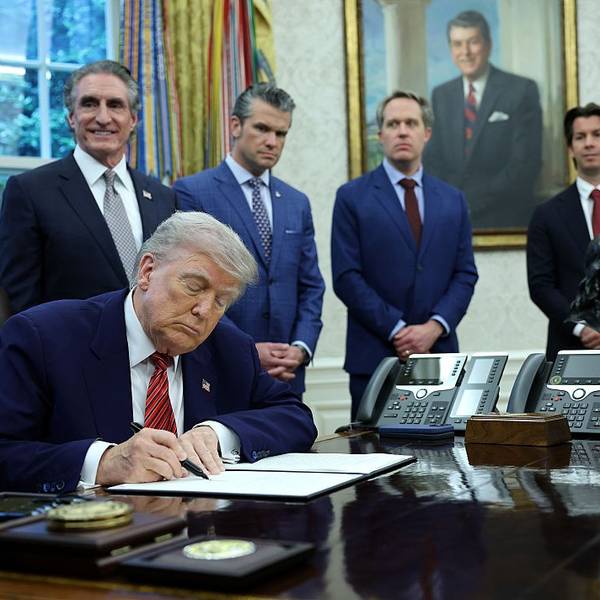Fukushima Campaign Seeks To Preserve Darkly Ironic Signs Underscoring False Promises of Nuclear Power
In an evacuated town, prominent billboards promote nuclear power. Some people say the municipality should leave them there
Japan's 2011 nuclear meltdown and catastrophe transformed Futaba--home of the Fukushima No. 1 power plant--into a ghost town, with every single resident forced to evacuate. But the municipality's empty streets still contain prominent billboards proclaiming the promise of nuclear power.
Now, Japanese media outlets are reporting that some residents and outsiders have launched an unusual effort to leave those signs in place as an ironic testament to the human and environmental dangers of the controversial energy source that is now hugely unpopular in Japan.
In a campaign led by 39-year-old Yuji Onuma, approximately 6,500 signatures were submitted on Monday to the local government urging them to leave the signs in their place.
Onuma was just an elementary school student when he wrote one of the four slogans prominently on display in Futaba: "Nuclear Power: Energy for a Bright Future." He organized the petition in March after learning that the Futaba municipality had plans to tear the signs down.
"Instead of getting rid of it as an inconvenient thing, it should be preserved for future generations as an embarrassing legacy," he told reporters Monday, according to Japan Times.
The Japan Times article noted: "Of the 6,500 signatures, however, only about 50 are those of evacuated Futaba residents. The reason is simple: Many of them want the sign to go."
Upon receiving the petition, Futaba Mayor Shiro Izawa reportedly said, "We will take your request into account, give it serious consideration, and make a decision from a broad perspective."
An Urgent Message From Our Co-Founder
Dear Common Dreams reader, The U.S. is on a fast track to authoritarianism like nothing I've ever seen. Meanwhile, corporate news outlets are utterly capitulating to Trump, twisting their coverage to avoid drawing his ire while lining up to stuff cash in his pockets. That's why I believe that Common Dreams is doing the best and most consequential reporting that we've ever done. Our small but mighty team is a progressive reporting powerhouse, covering the news every day that the corporate media never will. Our mission has always been simple: To inform. To inspire. And to ignite change for the common good. Now here's the key piece that I want all our readers to understand: None of this would be possible without your financial support. That's not just some fundraising cliche. It's the absolute and literal truth. We don't accept corporate advertising and never will. We don't have a paywall because we don't think people should be blocked from critical news based on their ability to pay. Everything we do is funded by the donations of readers like you. Will you donate now to help power the nonprofit, independent reporting of Common Dreams? Thank you for being a vital member of our community. Together, we can keep independent journalism alive when it’s needed most. - Craig Brown, Co-founder |
Japan's 2011 nuclear meltdown and catastrophe transformed Futaba--home of the Fukushima No. 1 power plant--into a ghost town, with every single resident forced to evacuate. But the municipality's empty streets still contain prominent billboards proclaiming the promise of nuclear power.
Now, Japanese media outlets are reporting that some residents and outsiders have launched an unusual effort to leave those signs in place as an ironic testament to the human and environmental dangers of the controversial energy source that is now hugely unpopular in Japan.
In a campaign led by 39-year-old Yuji Onuma, approximately 6,500 signatures were submitted on Monday to the local government urging them to leave the signs in their place.
Onuma was just an elementary school student when he wrote one of the four slogans prominently on display in Futaba: "Nuclear Power: Energy for a Bright Future." He organized the petition in March after learning that the Futaba municipality had plans to tear the signs down.
"Instead of getting rid of it as an inconvenient thing, it should be preserved for future generations as an embarrassing legacy," he told reporters Monday, according to Japan Times.
The Japan Times article noted: "Of the 6,500 signatures, however, only about 50 are those of evacuated Futaba residents. The reason is simple: Many of them want the sign to go."
Upon receiving the petition, Futaba Mayor Shiro Izawa reportedly said, "We will take your request into account, give it serious consideration, and make a decision from a broad perspective."
Japan's 2011 nuclear meltdown and catastrophe transformed Futaba--home of the Fukushima No. 1 power plant--into a ghost town, with every single resident forced to evacuate. But the municipality's empty streets still contain prominent billboards proclaiming the promise of nuclear power.
Now, Japanese media outlets are reporting that some residents and outsiders have launched an unusual effort to leave those signs in place as an ironic testament to the human and environmental dangers of the controversial energy source that is now hugely unpopular in Japan.
In a campaign led by 39-year-old Yuji Onuma, approximately 6,500 signatures were submitted on Monday to the local government urging them to leave the signs in their place.
Onuma was just an elementary school student when he wrote one of the four slogans prominently on display in Futaba: "Nuclear Power: Energy for a Bright Future." He organized the petition in March after learning that the Futaba municipality had plans to tear the signs down.
"Instead of getting rid of it as an inconvenient thing, it should be preserved for future generations as an embarrassing legacy," he told reporters Monday, according to Japan Times.
The Japan Times article noted: "Of the 6,500 signatures, however, only about 50 are those of evacuated Futaba residents. The reason is simple: Many of them want the sign to go."
Upon receiving the petition, Futaba Mayor Shiro Izawa reportedly said, "We will take your request into account, give it serious consideration, and make a decision from a broad perspective."

